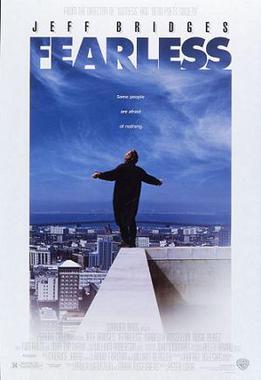 The hero of the movie (Max Klein, played by Jeff Bridges) has a near death experience in a plane crash and then feels invulnerable because he is a “ghost” -- he can't die because he's already passed his own death by. Another survivor (played by Rosie Perez) calls him an “angel”, but his wife rejects this: “he is a human and can’t live up there.” Thus the movie suggests that Max is expressing a Platonic view of fear and invulnerability, and then argues that this lack of fear entails lack of ability to relate to other humans.
The hero of the movie (Max Klein, played by Jeff Bridges) has a near death experience in a plane crash and then feels invulnerable because he is a “ghost” -- he can't die because he's already passed his own death by. Another survivor (played by Rosie Perez) calls him an “angel”, but his wife rejects this: “he is a human and can’t live up there.” Thus the movie suggests that Max is expressing a Platonic view of fear and invulnerability, and then argues that this lack of fear entails lack of ability to relate to other humans.In this way the movie could be seen as anti-Christian: any theory of life according to which the suffering of this life is overridden by an other-worldly meaning inevitably drains the significance out of our relationships with other finite and vulnerable beings. But the Christian view is not identical to this Platonic-Stoic view. In the movie, Max's therapist says Max has to re-live his near death experiences to keep up the “high” of fearlessness. (This is confirmed by the fact that Max intentionally puts himself in mortal danger throughout the film whenever his real life starts to close in on him again).
But as Christians we need not be angels or ghosts or physically invulnerable to escape our fear. We don’t have to “live up there” because Christ has come down here. And through baptism we are sacramentally united to Christ in his death raised to new life through him. Like Max, we can’t fear death because we have already died. But this does not entail an inability to acknowledge vulnerability and to relate to humans. Christian fearlessness is closer to a Heideggerean being-toward-death: an acknowledgement of finitude which gives value to our present embodied moments. But what Christianity adds is the Schleiermacher and Otto feeling of dependence/creaturehood that comes along with finitude: once I recognize that I am not God, I can encounter the true God and relinquish control to him, thereby overcoming fear.


No comments:
Post a Comment